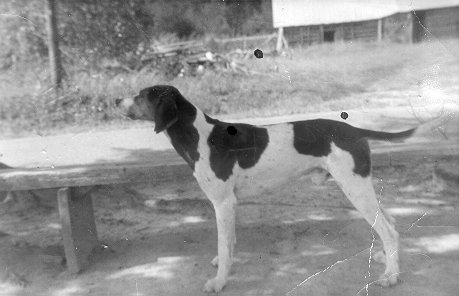 |
Remembrances: Larry Coppock--About Dad: Rabbittown

When asked about my dad the first thing that I recollect were his formative years growing up in the foothills of the Appalachian mountains in Rabbittown, Alabama, named after a Cherokee Indian chief. Based on childhood memories, experiences, and accounts from relatives, I can describe the way that he was raised as having a 'Sergeant York'-type upbringing. A rather dubious depiction, I know. But anyone who would admit to being from the Valley of the Three Forks, Tennessee or Rabbittown speaks volumes about their honesty, truth and decency.
My dad was not a Medal of Honor recipient like York, although he served in an infantry division- the 89th-in World War II as did York in World War I - the 82nd. And, being reared in Rabbittown was not unlike growing up in rural Tennessee, Arkansas or almost any rural setting in the deep south.
Dad was raised in a one room shack. Like the 'big bad wolf' in the children's nursery rhyme, a good storm could act to rearrange where you slept with a gust of wind here or there. No insulation. Well-water for drinking. One cow for milking, Betsy. One mule for plowing, Jack. One outhouse for …well, you know what for. One blue tick hound for hunting, Leed. Leed was such a good hunting dog that when I learned of the Coon Dog cemetery near Russellville for all the famous coon dogs in Alabama, I reckoned Leed belonged there.

Leed
Officially, my dad's occupation on his DD 214 Army discharge listed him as a farmer. To make ends meet for his widowed mother and only brother, he drove a lumber truck and operated a band saw in the winter. Born in1914, economists would say that he lived in the time of the Great Depression. However, I don't remember any family member using that as a reason for not having material things. In fact, I would venture to say that Rabbittown was not much different in 1960 than it was in 1930.Clyde Tompkin's store was the gathering place for some like Pink Burns who drove his surplus blue army jeep there to catch up on all the gossip for over 50 years. When he died just 2 years ago the local paper wrote an article about how he would be missed.
A simple, spiritual foundation seemed to abide in all who lived in Rabbittown as far as common decency, common sense, and uncommon devotion to family and friends. I believe that these experiences shaped what my dad would be called on to do in the 1940's like so many of his contemporaries. For the war to come would dramatically impact his life and those of millions of other Americans for years to come.
Don't forget to say' I love you'
Dad passed away in 1960 at the age of 46 when I was 8 years old. He had fought the battle of his life trying to beat chronic kidney disease. I have fond memories of our limited time together. He taught me the value of sports and competition, just by playing pitch and catch with me when he should have been resting. And, when he was on his hospital bed dying, I vividly recall my dad calling my sisters, my mother and I up to his bedside for a final hug and kiss, one by one, amidst a strange looking oxygen tent. He taught us how to be brave and loving in dying. He did this so well that as an 8-year old I had no idea that this was the last time that I would see him alive. I wanted to say 'I love you dad' to him one more time. I wanted to play pitch one more time. I wanted to go hunting with him and fishing just one more time. I learned later that God needed him more.
Upon turning 50 last year, many of these memories began to take their toll. I had played as a boy with my dad's army helmet, his leggings, and cartridge belt. My best friend and I played and even argued which was the best, the Army or the Navy. We enjoyed as many war movies as 2 teenagers could ever want to see. Statistics about battles rolled off of our heads as easy as remembering the batting averages of all of the New York Yankees.
Years passed and I have long forgotten the batting averages and the sports trivia that my best friend, Benny and I had so much fun with. I began to see World War II from a much different perspective. These veterans were dying at the rate of several thousand per day. And, I suddenly realized that I had never met anyone who had served in the war with my dad. Was it too late? The military records that I had sat on for over 13 years suddenly became a rare treasure to be explored and quickly. There was a yearning deep inside to try to find where my dad served during the war. Not only where, but what type of gun did he carry. Was he decorated? Is there anyone alive now who knew him and if so how could I locate them. A rush of thoughts overcame me. The search about dad and the Greatest Generation was on.
Rabbittown vocabulary:
Recollect=remember (one of my grandmother, Nettie Mitchell's favorite words)
Youins=you folks
Naryn=none(another one of my grandmother's quips)
Buffalo nickel=5cents(my grandfather, Bennett Mitchell, would always give me upon going back home)
Indian head nickel=5 cents
Polk Salad= turnip like vegetable; must boil to get the 'poison' out for consumption
Rock Hammerin '= effective way to fish without using any fishing line
Rabbittown= named after a Cherokee Indian, Chief Rabbit
And, last but not least, Dad in the story=Benjamin Floyd Coppock, my father (My 19 year old son, Benjamin, is named after him)
<< Previous |
Next >>
|
 |


